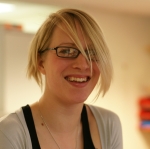Student Award for Public Engagement
By Anne Welsh, on 26 January 2012
UCL Department of Information Studies and the UCL Centre for Digital Humanities are proud of Claire Ross, who has won the student category of the Provost’s Awards for Public Engagement.
In this guest blog post, Hilary Jackson (UCL Public Engagement Unit) explains Claire’s award and highlights other public engagement opportunities for students.
For the Public Engagement Unit, the annual Public Engagement Awards are one of the highlights of our year. Last night’s party was no exception.
The winner of this year’s student category was Claire Ross from the Centre for Digital Humanities and Department of Information Studies.
Claire was nominated for engaging museum visitors with collections at UCL and beyond, using innovative, digital methods and social media applications. The selection panel loved the fact that this subject is plainly not just Claire’s PhD, but her passion. What’s great is that Claire’s work, alongside colleagues on the QRator project (amongst others), has enabled the public to influence what’s going on in UCL’s museums and the university more widely.
There’s so much fantastic public engagement going on at UCL that the awards are really only the tip of the iceberg. The Public Engagement Unit is here to help UCL students and staff to make the best of that work, ensuring there are benefits both for the public and for the UCL community. We can help with funding, advice, support, recognition, and are working hard to make sure public engagement remains part of UCL’s agenda.
We’d love to hear from you so do get in touch – publicengagement@ucl.ac.uk
http://www.ucl.ac.uk/public-engagement
http://www.ucl.ac.uk/public-engagement/opportunities/awardwinners2011
 Close
Close





 Five students from the
Five students from the 

